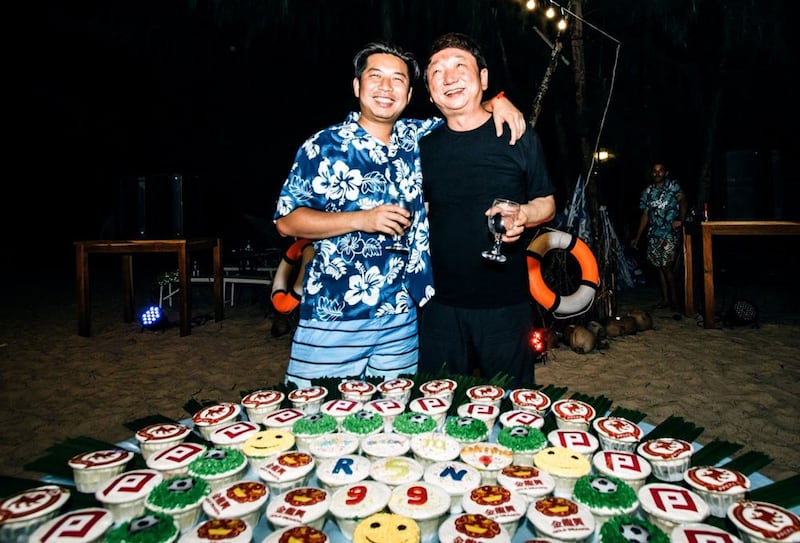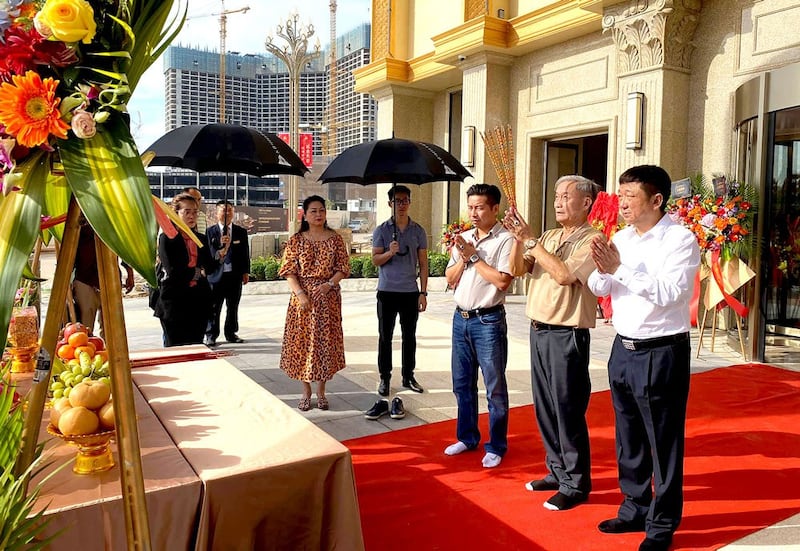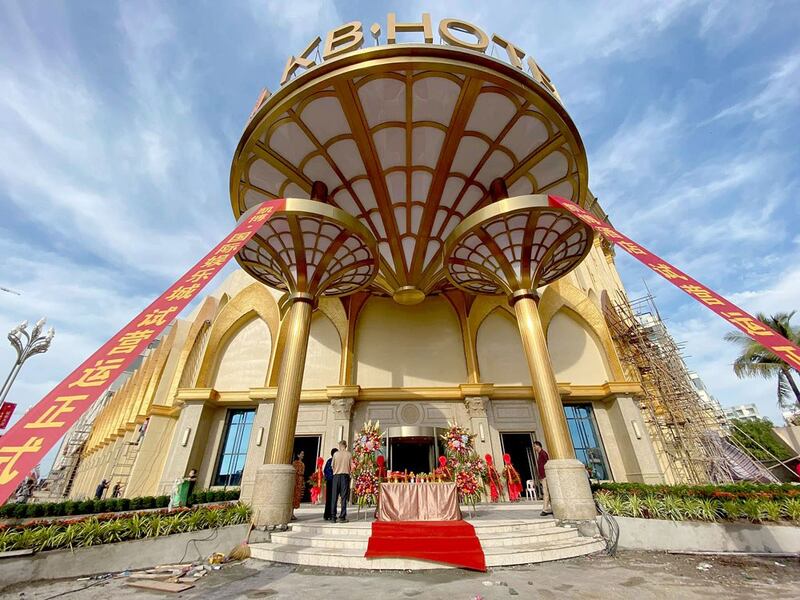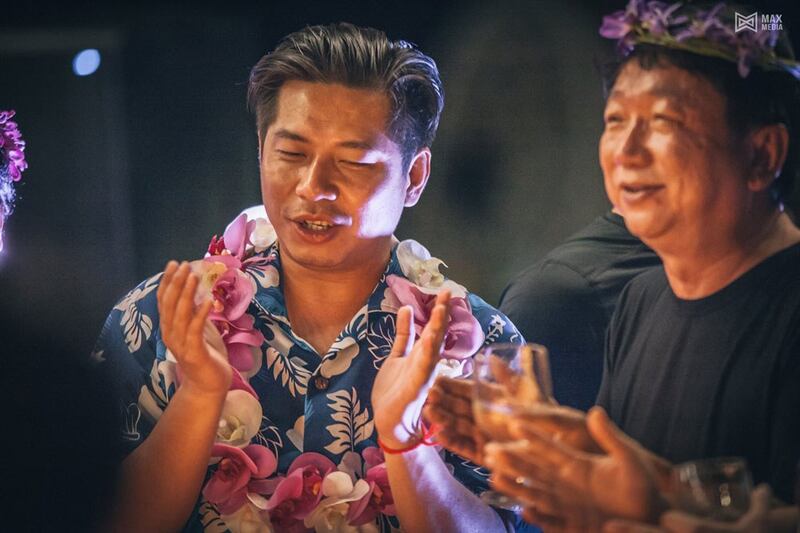Political connections in Cambodia have allowed a major Chinese fugitive to elude jail while building a business empire, an investigation by RFA has found.
Xu Aimin was sentenced to 10 years in a Chinese prison in 2013 for masterminding an illicit international gambling ring with an estimated turnover of $1.75 billion. Rather than do the time for his crime he has instead spent the last eight years building an immense Cambodian business empire, including, ironically enough, a capacious casino in the port city of Sihanoukville.
The financially savvy fugitive owes both his commercial success and liberty to high-level political connections in Phnom Penh. Those connections are perhaps best illustrated in a photo posted to the Facebook page of the Royal Gendarmerie of Cambodia, or Military Police.
At the center of the photo, taken in December 2018 at the Kantha Bopha Children’s Hospital in Phnom Penh, are 2,000 hundred-dollar bills, bundled together on a silver plate, which is being received by the hospital’s then-CEO Peter Struder.
Flanking Struder and handing him the plate are Xu, with a weathered face and brown suit, and a markedly more fresh-faced Rithy Samnang. Known simply as “Tek” by his friends, Samnang is the son-in-law of ruling party senator Kok An, who made his fortune during the 1990s in the cigarette and casino businesses.
Standing next to Xu is another entrepreneurial Chinese émigré, Su Zhongjian, who counts among his business partners Try Pheap, a U.S.-sanctioned timber tycoon and confidant of Prime Minister Hun Sen. Together, Xu, Samnang and Zhongjian are the owners of the KB Hotel & Casino in Sihanoukville and RSX Investment Co. Ltd. Presiding over the donation is national Military Police Commander Sao Sokha.
A Wanted Man
Just eight years earlier, Xu’s billion-dollar gambling racket in China had run into problems. The center of the action was Jingzhou, a city on the banks of the Yangtze River in Hubei province, best known for its 1,200-ton bronze statue of an ancient war god.
In October 2010, Jingzhou police were alerted to online baccarat being offered at a city hotel. Gambling having been illegal in China since 1949, an investigation was launched that traced the operation to a server in Sihanoukville, Cambodia.
Two years later, on December 14, 2012, a triumphant article appeared in the China Daily, announcing the shutdown of a "major international gambling ring" with a turnover of 11 billion yuan ($1.75 billion) and 120 agents identified within China alone and 27 suspects apprehended. In all its triumphal excitement the state-owned newspaper omitted to mention one crucial detail: the operation's ringleader was still at large.

In Hong Kong, with cash to spare
In fact, just one week before the reported bust of the gambling ring, Xu was in Hong Kong setting up a new company.
The company, Amin Capital Limited, was established as a vehicle to invest in Chinese IT start-ups, according to a former business associate of Xu, who asked not to be identified, citing reputational concerns. However, the source added, Xu quickly changed his mind and said that he was “not confident in China’s future anymore.” The company was de-registered in early 2014.
In June 2013, just six months after Amin Capital Limited was registered with the authorities, Xu would find himself the subject of an Interpol Red Notice, sometimes described as an international arrest warrant. The notice described Xu as the “chairman of one gambling group” wanted in mainland China “after a 10-year imprisonment sentence had been imposed on him by a Chinese court,” according to court documents.
By November 2013, a Hong Kong magistrate issued a warrant for Xu’s arrest over allegations he had laundered more than 300 million yuan ($46 million) in proceeds from the online baccarat operation through five bank accounts held with the Hong Kong branch of HSBC.
A 2016 court judgement revealed that as of July 2013, the accounts – four of which were in Xu’s name, the fifth in that of a British Virgin Islands shell company controlled by him – held a total of 654 million Hong Kong dollars ($84 million). Records held by the Hong Kong tax authorities showed that despite holding these vast sums in accounts in the territory, neither Xu nor his shell company had filed tax returns there in the previous seven years.
The money in those accounts was made the subject of an asset freeze over suspicions it was the proceeds of organized crime. Xu, however, never submitted to the arrest warrant. As the judge in the case dryly noted, he was elsewhere. He conveniently fled Hong Kong on May 5, 2013, one month before the Interpol Red Notice would set the local authorities on his trail.
“For reasons best known to [Xu], he chooses to remain in Cambodia, a country that he is not wanted [in] for any judicial proceedings,” wrote Judge Andrew Chan.

A very long holiday in Cambodia
It is remarkable that Xu has been able to remain in Cambodia for so long with warrants for his arrest active in China and Hong Kong. Both Hun Sen and Chinese President Xi Jinping have in recent years made repeated public reference to their two countries’ special relationship, which the Cambodian premier described in July 2020 as an “unbreakable friendship.”
China’s contribution to this friendship comes largely in the form of direct investment. Since the launch of China’s cross-continent Belt and Road Initiative in 2013, Chinese investment in Cambodia has ballooned, and by 2019 reportedly accounted for 43 percent of all foreign direct investment in the country.
In return, Cambodia has become what academics have termed a “client state” to China. Cambodia has repeatedly sided against its fellow Association of Southeast Asian Nations (ASEAN) members in their disputes with Beijing over the South China Sea, and since the start of 2019 has hosted Chinese police officers in the National Police headquarters in Phnom Penh.
In 2019 alone, 1,145 Chinese nationals were arrested and returned home, accounting for 74 percent of all persons deported from Cambodia that year, according to a January 2020 report by the General Immigration Department cited by news site Thmey Thmey. In September 2019, over 150 Chinese were deported in a single flight for gambling-related offences.
So how has Xu managed to slip through this dragnet year after year? A January 2014 report by Chinese-language portal Jingzhou News appears to hold the answer.
According to Jingzhou News, Xu’s gambling ring was taken very seriously by China’s Ministry of Public Security. The ministry dispatched senior officials to Cambodia multiple times during 2012 and 2013 to seek the arrest and deportation of the individuals behind the scheme. The officials even met with Cambodian Interior Minister Sar Kheng.
While some 36 suspects in the case were eventually arrested, at least six of them in Cambodia, Xu was never put on a plane back to China. This was, Jingzhou News reported, “because of [his] Cambodian citizenship and relationship with Cambodian high-level officials.”
It is unclear when Xu acquired Cambodian citizenship, but Ministry of Commerce records suggest it was sometime prior to 2012. Cambodia’s Law on Nationality stipulates that Cambodian citizens must not be extradited “unless there is a mutual agreement.” A 1999 extradition treaty signed by China and Cambodia would seem to constitute such a “mutual agreement,” although it does give both countries “the right to refuse extradition of its own nationals.” Phnom Penh appears to have exercised this right in the case of Xu.
The Chinese embassy in Phnom Penh did not respond to repeated requests for comment on the case or its significance for Sino-Khmer relations. Spokespersons for the Cambodian government, General Directorate of Immigration, Sihanoukville municipality, National Police, and Ministry of Justice all declined to comment on questions put to them by RFA for this story.
Meas Soksensan, spokesman for the Ministry of Economy and Finance, also declined to address whether the government had conducted due diligence before granting a gambling and casino license to Xu Xu’s KB Hotel & Casino in Sihanoukville. But the spokesman told RFA that it was not until November 2020 that Cambodia had adopted the Law on the Management of Integrated Resorts and Commercial Gambling, which establishes regulatory oversight of the gaming industry. He said existing casinos will have to comply with its provisions including on conducting due diligence and following license application procedures.
That Xu has managed to remain in Cambodia unmolested is of no surprise to Clement Lai, a former Hong Kong police superintendent who has opened a security consultancy in Phnom Penh since retiring. Lai described Xu as a well-known tycoon with close ties to military and government officials which may ensure he receives "preferential treatment and convenience" for both his businesses and personal safety. He added that while China and Cambodia have an extradition treaty, the Cambodian authorities often give consideration to an individual’s influence and investments when deciding how to implement it.
"He is not a highly dangerous person and he gives the country a lot of economic support," Lai said. "It's not surprising that he has been able to stay in Cambodia for a long time."

Who’s the patron and who’s the client?
While on a geopolitical level Beijing is the patron and Phnom Penh the client, when it comes to doing business in Cambodia the relationship is flipped on its head. Any Chinese investor looking to establish a Cambodian enterprise must first find a Cambodian patron. Xu appears to have found that patron in Rithy Samnang, the son-in-law of ruling party senator Kok An.
The first record of Samnang and Xu going into business together comes in October 2017, when they founded RSX Investment Co. Ltd. together. Also on board as a founding shareholder and director was Chinese-born real estate developer Su Zhongjian, who was made a naturalized Cambodian citizen by royal decree two years earlier.
From the moment they went into business together, almost anytime Samnang was photographed in Sihanoukville, Xu would be in shot, often with a half-smoked cigarette in hand. On March 22, 2018, Samnang threw a beach party for his 37th birthday on the island of Koh Smach, some 35 miles from Sihanoukville. Photos of the event give some indication of the close bond between the tycoon and his fugitive business partner. In countless images, Samnang is flanked by his wife Phu Cherlin on his right-hand side and Xu to his left. Frequently the two men have their arms around one another, smiles on their faces.
Visually, Xu and Samnang are an odd pairing. Scion of one of the country’s wealthiest dynasties, Samnang plays the part perfectly with his back always straight, a winning smile seemingly pinned to his face and perma-coiffed hair. Xu’s shoulders, conversely, are stooped, his skin weathered. If Samnang is a vision of the model son-in-law then Xu is the disreputable uncle.
But however unlikely they may appear as a pair in photographs, their relationship is typical of Sino-Khmer business partnerships, according to a paper published last year by University College London researcher Sokphea Young.
Drawing on years of in-country research and interviews, Young found Chinese investments can only flourish in Cambodia with the patronage of a local business partner, who acts as a lobbyist-cum-bagman for the project.
These Cambodian partners usually hold the title “oknha,” a position similar to that of a lordship, bestowed on tycoons who have demonstrated their loyalty to the ruling Cambodian People’s Party by donating at least $500,000 to national development projects. Rithy Samnang is an oknha, for example.
The tycoon’s job in such partnerships is to use their influence to grease the regulatory path of the project and to leverage their connections in politics and law enforcement to ensure the project is not preyed upon by rent-seeking officials or rivals. In return, the tycoon is compensated up front, will often be made a shareholder in the enterprise, and will likely be entitled to a split of any profits.
“The first thing Chinese companies do when they get here is find a backer, like an oknha, who will help them get through various difficulties, liaise with government officials, and so on,” the Cambodian office manager for a Chinese state-owned enterprise told Pál Nyiri, another researcher. “Whether or not you will have to share the profits – that varies. But first you have to pay.”

Getting back to his roots
Xu and Samnang did not respond to detailed requests to comment on this story. Today, however, they are the masters of an emerging Sihanoukville real estate empire. In October 2019 they broke ground on KB Central, a 600,000-square-meter combined residential and commercial complex near the city’s Otres beach. In a speech to inaugurate the project, Deputy Provincial Governor Mang Sineth told an assembled crowd that KB Central would be worth half a billion dollars when completed.
The shining jewel in their current portfolio, however, is the KB Hotel & Casino. Situated on Xu Aimin Avenue, a little over 800 meters from Otres beach, the KB Hotel opened its doors in December 2019 with a ceremony at which both Samnang and Xu burned ceremonial candles.
The property’s core offering appears to be its 650-square-meter casino floor, which marketing materials claim hosts 15 gaming tables, seven slot machines and a VIP gaming room.
The hotel’s website is in Chinese, suggesting that Xu has returned to Sihanoukville to do what got him into trouble there in 2012 – giving Chinese gamblers a place to gamble. The Chinese Embassy in Phnom Penh issued a warning to its citizens in January, as it did the two previous years, not to get involved in gambling activities. However, that does not appear to have deterred the KB Hotel, which the following month put out adverts for croupiers and assorted casino staff.
Xu may be playing a dangerous game. But with no shortage of Cambodian officials willing to endorse RSX Investment’s businesses – from the provincial deputy governor, to the national head of the military police and Rithy’s senator father-in-law – it seems unlikely to catch up with him any time soon.
